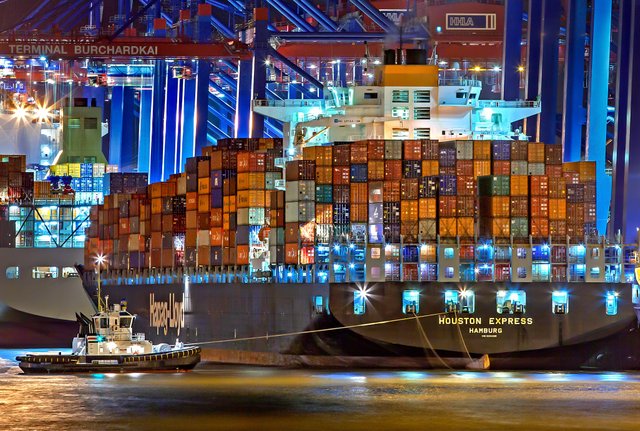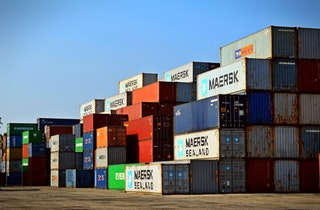Blockshipping Can Help Save Over $5.7 Billion A Year For Global Shippers
In 2017, the Port of Los Angeles loaded and unloaded over 705,000 maritime freight containers like those pictured above. Of these 700,000 containers, 185,000 were empty containers that were loaded back onto ships for export.
The reason behind the bulk of empty containers is very complex and has much to do with international trade and the import and export patterns of different nations. However, it also is partly due to the way that containers are transacted between shipping lines, trucking companies, warehouses, buyers, and sellers.
The current system results in empty containers being unused, underused and shipped to distant locations when other empties are nearby. The core of these problems is that containers are owned by different businesses (shipping lines, container companies) and sharing containers is almost impossible.
The Global Shared Container Platform Has The Solution
The Global Shared Container Platform (GSCP) is a blockchain based platform that will create an ownership registry of containers that will allow them to be tracked and deployed via smart contract.
GSCP is a platform being introduced by Blockshipping, a Danish company with over 75 years of container shipping experience. The team is backed by the Danish Maritime Fund and has team members and advisors that work and have worked for the largest shipping lines in the world including Maersk and Hapag Lloyd.
GSCP is going to introduce a multi-step approach to increase efficiency in container transport that aims to save $5.7 billion a year for global shipping companies. This multi-step approach begins and ends with the Greybox Opportunity.
The Greybox Opportunity
Repositioning empty containers are estimated to cost the industry $15 to $20 billion per year. The main source of this problem is that containers are owned mostly by shipping lines. If Maersk has empty containers in the U.S. but needs to ship goods from China they can either lease containers from a private company (if there is enough inventory) or ship the empties to China.
Both solutions have problems, they are expensive and shipping containers take times. GSCP is looking to create a Greybox Container Ecosystem where all carriers share containers globally. The Global Shared Container Platform will provide the container ownership registry as well as the geolocation tracking ledger, both built on the Ethereum Blockchain.
The Greybox system also reduces issues caused by street turn/triangulation which is the movement of empty containers over land. When an importer receives a shipment from a sea container it is often driven to their warehouse and off-loaded. This empty container then returns to the port rather than routing to a nearby exporter looking to send cargo to the port.
Over time the platform will begin to utilize hardware sensors to locate containers and will use predictive analysis and advanced metrics to predict supply and demand of empties. The platform may one day be able to automate the process of empty container routing and payments via smart contract.
The Steps To Success
The platform is implementing its full system in four phases and is looking to be complete by early 2019. Phase 1 has been in development since late 2017 and will result in the ability to track ownership and location of containers via the blockchain.
This phase will also include the completion of smart contracts for payment processing and a customer UI.
Phase 2 will introduce the Greybox and Street Turn management apps to the ecosystem along with a truck appointment, container damage verification, and container investment syndicate system.
With Phase 3 the GSCP begins moving into the world of artificial intelligence and automation. The platform will complete the imbalance forecasting module, container efficiency dashboard, and flow optimization.
The final phase will begin to utilize sensor-based tracking for location, CO2 emissions, and will focus on additional security and cost features.
The Token System
GSCP is using a two token system, one for internal transactions and a second for fundraising and revenue sharing.
The internal token, CPT, is used for any internal transaction including service fees, fumigation fees, and storage fees. These tokens cannot be sold on exchanges and are meant for industry only.
When looking at projects that issue their own tokens I always ask myself a couple questions, would this token work better if its price were stable? Secondly, would this token work better with infinite supply? What I've found is that the answer is yes to both for most projects.
For GSCP the answer is yes and they have used that to their advantage. Large-scale industries budget costs years in advance and requires stable fees. Shipping lines contract fuel prices 5 years at a time so it is unrealistic to think that they are willing to pay a fluctuating price for the use of a container.
Smartly GSCP is going to peg the CPT token to $1 USD and the amount of tokens is unlimited as they will be created when purchased and destroyed when spent.
You might be wondering why there is the second token. The second token CCC is initially used to fund part of the platform. The platform has already been funded by early investors (soft cap fulfilled) but is offering some to the public.
After funding the platform the CCC tokens will allow token holders to take part in revenue sharing. A percentage of each transaction will be shared with token-holders depending on the amount of CCC they hold.
Token summary:
- CPT = Industry only, untradeable, internal token pegged at $1 USD
- CCC = Tradeable token, receives a portion of the platforms revenue
For More Information on Blockshipping
📅Token Sale Dates: June 14
📈Token Ticker: CCC
Website || Whitepaper || ANN Thread || Telegram || Bounty
Keep Tabs On Me
Daily articles about cryptocurrency and blockchain based projects.
Steemit || Twitter || BitcoinTalk Profile



